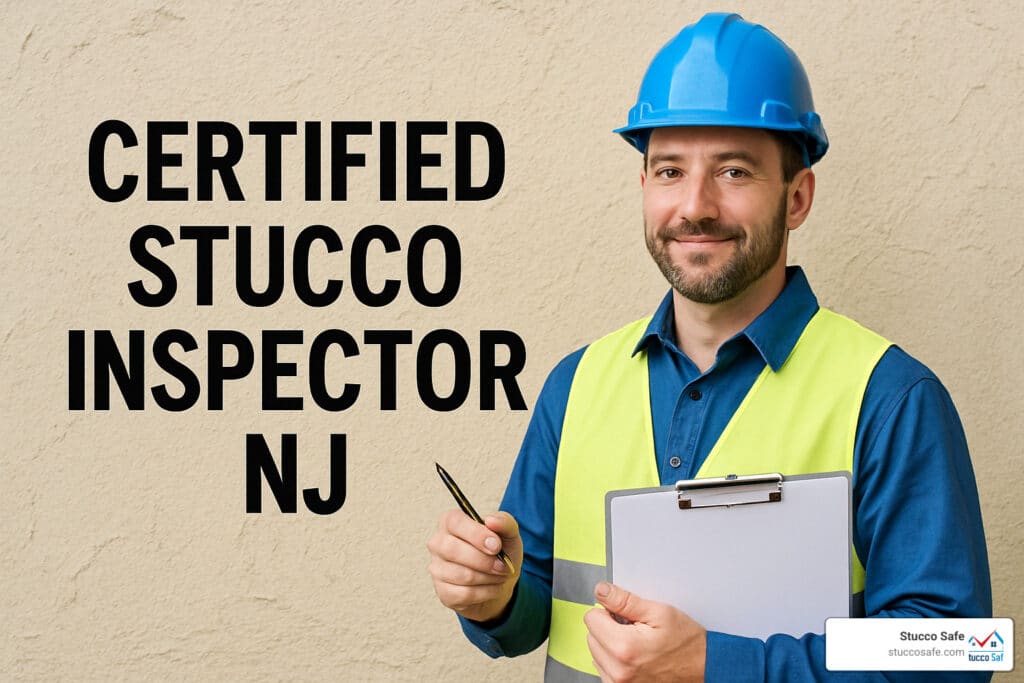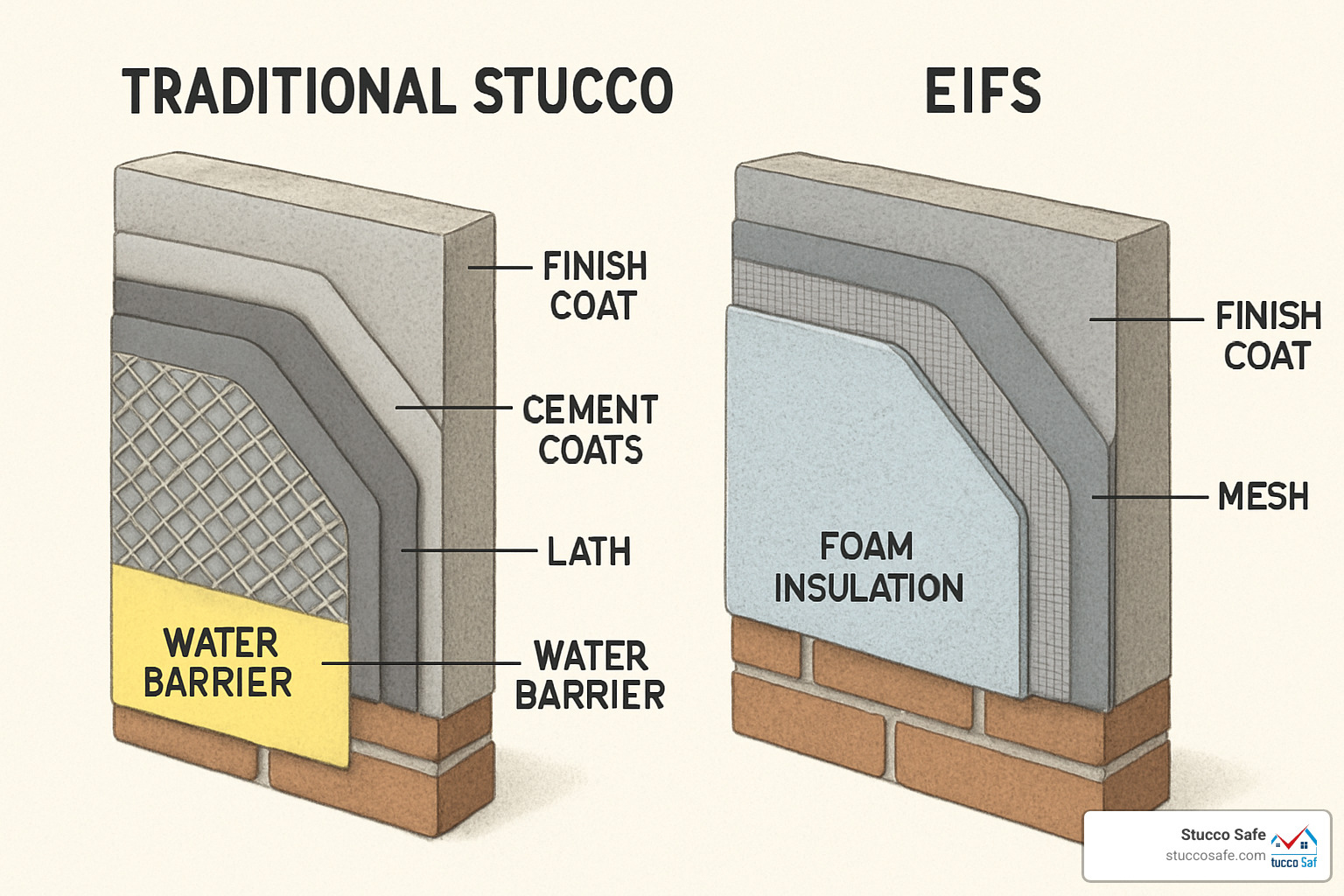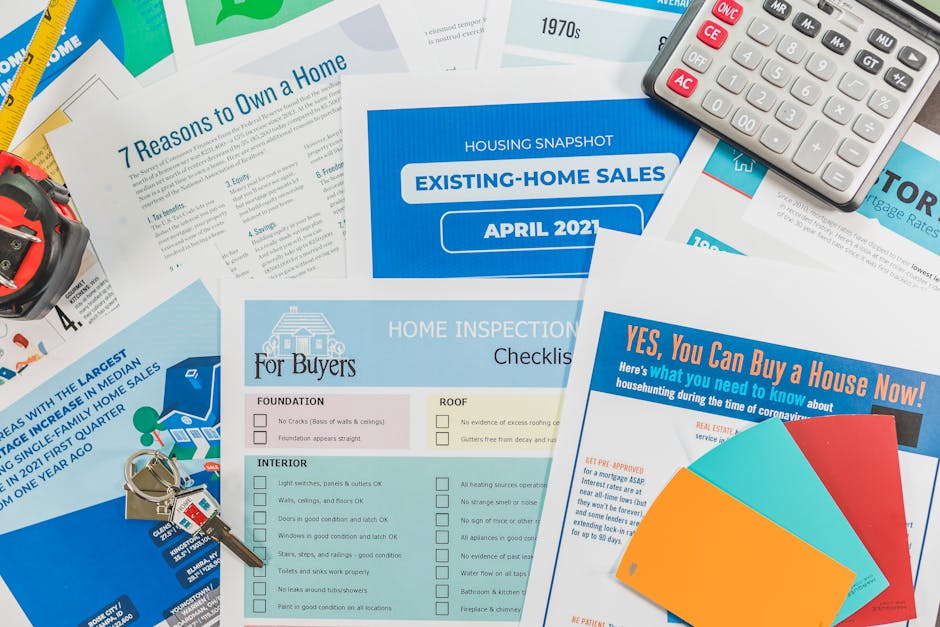Certified stucco inspector NJ: Top 3 Essential Tips 2025
Why Certified Stucco Inspections Matter in New Jersey
Looking for a certified stucco inspector NJ? Here’s what you need to know:
| Finding a Certified Stucco Inspector in NJ | What to Know |
|---|---|
| Best Qualifications | Look for EDI Level 2 Certification, ASHI membership, and moisture testing expertise |
| When to Inspect | Every 2 years, before buying/selling a home with stucco, or if you notice moisture stains |
| Average Cost | $495-$1595 depending on home size and inspection depth |
| What’s Included | Visual assessment, infrared scanning, moisture testing, and detailed report |
| Importance | 90% of stucco homes built between 1993-2006 have installation defects |
It is estimated that more than 90% of all stucco applications in the Northeastern United States, within the past 15 to 20 years, are improperly installed. This alarming statistic highlights why finding a certified stucco inspector NJ is crucial for homeowners and buyers across New Jersey. Unlike standard home inspections, specialized stucco evaluations use advanced moisture detection techniques to uncover hidden damage that could cost upwards of $100,000 to repair if left unchecked.
A certified inspection isn’t just about peace of mind—it’s about protecting your investment. Properties earning a stucco certification not only receive higher bids but sell faster than stucco buildings that haven’t been professionally assessed. In fact, homes with a MoistureFree Warranty (which requires a certified inspection) can reduce time on the market by as much as 50%.
I’m Gabe Kesslick, founder of Stucco Safe and an EDI Level 2 certified stucco inspector NJ with over 20 years in leak detection and forensic building envelope analysis. My team and I have inspected thousands of homes across New Jersey, identifying moisture issues before they become catastrophic structural failures.
Certified Stucco Inspector NJ: Why Certification & Specialization Are Crucial
Finding a certified stucco inspector NJ isn’t just about checking a box—it’s about protecting what might be your biggest investment. Think of it this way: would you trust a general mechanic to rebuild your Ferrari’s engine? Probably not. The same principle applies to stucco inspections.
New Jersey’s climate creates the perfect storm for stucco problems. Our humid summers, freezing winters, and coastal storms put tremendous stress on exterior finishes. Without proper installation and maintenance, moisture finds its way in, silently destroying your home from the inside out.
“I’ve seen too many heartbroken homeowners facing $100,000+ repair bills because they skipped a proper inspection,” says our senior inspector James. “By then, the damage is done—and insurance rarely covers improper installation issues.”
What makes a certified stucco inspector NJ worth their fee? It starts with credentials and training. All Stucco Safe inspectors are certified and highly trained. These inspectors understand how moisture moves through building materials and how to detect it using specialized equipment like professional-grade infrared cameras and Delmhorst moisture meters.
“When I tell clients I’m a certified stucco inspector NJ, it means I’ve invested many hours understanding how buildings work as systems,” explains Chris, our lead inspector for Bergen County. “I’m not just looking for problems—I’m connecting dots that others might miss.”
This expertise becomes particularly crucial for homes built between 1993 and 2006—a period now known for widespread code compliance issues in stucco application throughout New Jersey. During these years, installation standards weren’t consistently enforced, creating a perfect storm of moisture vulnerability in thousands of homes.
Signs You Need a Certified Stucco Inspector NJ
While we recommend stucco inspections every two years as preventative maintenance, certain situations should send you reaching for the phone to call a certified stucco inspector NJ right away:
Dark staining on your exterior walls isn’t just an aesthetic issue—it’s often the first visible sign of moisture problems behind the stucco. Similarly, if your walls appear wavy or bulging, that’s the stucco telling you something’s wrong underneath.
Interior warning signs are equally important. Damp spots on interior walls that share an exterior stucco surface, especially after rain, indicate moisture is finding its way through. Even subtle musty odors can signal hidden mold growth from stucco-related moisture intrusion.
Pre-sale due diligence is another critical time for professional stucco evaluation. If you’re buying or selling a stucco home in New Jersey, particularly one built during that risky 1993-2006 window, a specialized inspection can prevent unpleasant surprises and protect your investment.
“Gabe was incredibly patient explaining the whole process,” shares Tracy S., a recent client. “I knew nothing about stucco when we started, but he broke everything down in simple terms that helped me understand what we were looking at and why it mattered.”
With moisture damage repair costs frequently reaching six figures, the few hundred dollars for a professional certified stucco inspector NJ might be the best insurance you can buy. At Stucco Safe, our inspections range from $495 for basic visual assessments to $1595 or more for comprehensive evaluations of larger homes—a small price compared to the peace of mind and potential savings they provide.
Traditional Stucco vs EIFS: Typical Failures & Warning Signs
Understanding the difference between traditional stucco and EIFS (Exterior Insulation and Finish System, often called synthetic stucco) is crucial when seeking a certified stucco inspector NJ. These systems fail differently and require specific inspection approaches.
Traditional Stucco is like that century-old family recipe – time-tested and reliable when done right. This cement-based material gets applied in three coats over a water-resistant barrier and metal lath. When properly installed, it can last 50-100 years. Unfortunately, in today’s construction world, shortcuts have become common, leading to widespread failures.
EIFS, the newer kid on the block, is more like a modern sandwich – layers of different materials working together. It consists of foam insulation board covered with a thin base coat, reinforcing mesh, and a finish coat. When EIFS first arrived in the U.S. in the 1970s, these systems had no way for water to escape once it got in – a recipe for disaster. Newer “drainage EIFS” systems include escape routes for water, but proper installation remains a challenge.
Here’s how these systems stack up against each other:
| Feature | Traditional Stucco | EIFS (Synthetic Stucco) |
|---|---|---|
| Composition | Portland cement, sand, lime | Foam insulation with polymer-based coating |
| Thickness | 7/8″ to 1″ thick | 1/4″ coating over 1-4″ foam board |
| Water Management | Relies on barrier system | Modern systems include drainage plane |
| R-Value (Insulation) | Low (R-0.2 per inch) | High (R-4 to R-5.6 per inch) |
| Common Failures | Cracking, improper flashing | Trapped moisture, delamination |
| Inspection Method | Invasive moisture testing | Both thermal imaging and invasive testing |
| Repair Costs | Generally lower | Often higher due to hidden damage |
Why New Jersey Homes Are at Higher Risk
New Jersey homes face unique challenges that make proper stucco installation even more critical. Think of it as the perfect storm of conditions that can turn minor issues into major headaches.
Our Garden State climate is particularly tough on stucco. Near the Jersey Shore, homes get battered by salt-laden, wind-driven rain that finds every tiny crack or gap. Our seasonal temperature swings create expansion and contraction that stress stucco bonds, opening doorways for moisture. Then our humid summers reduce the system’s ability to dry out after water intrusion – like trying to dry your clothes in a steamy bathroom.
Many New Jersey homes also suffer from what I call the “too-close-to-the-ground” problem. Proper stucco installation requires at least 6-8 inches of clearance above soil level, but many builders ignore this crucial detail.
“In Northern New Jersey, we have stringent building codes now, but during the 1993-2006 period, code gaps allowed problematic installations,” explains our Bergen County inspector. “Combine that with our challenging climate, and you have a recipe for moisture problems that only a certified stucco inspector NJ can properly assess.”
Most Common Stucco Problems Found in NJ
After inspecting thousands of homes across New Jersey, we’ve seen certain issues pop up time and again. These aren’t just minor cosmetic problems – they’re potential gateways to significant damage.
Missing or improper weep screeds top our list of common defects. These little components might not look important, but they’re critical for allowing water to drain from behind the stucco. When missing or improperly installed, moisture gets trapped with nowhere to go.
Failed sealant joints around windows, doors, and penetrations are another frequent culprit. Caulking deteriorates over time, especially with our harsh NJ weather cycles. What was once a watertight seal becomes an invitation for moisture.
Improper flashing – especially those crucial kick-out diverters where roofs meet walls – often gets overlooked or installed incorrectly. These components direct water away from the stucco, and when they fail, water runs directly into the wall system.
Behind seemingly intact stucco, we frequently find substrate rot where OSB or plywood sheathing has deteriorated. Even more concerning is what we call non-OSB substrate confusion – materials like Celotex, MDF, or Homasote that less experienced inspectors might misidentify during testing.
Many homes also suffer from insufficient ground clearance, with stucco extending too close to soil level. This creates a direct path for moisture to wick upward into the wall system – like leaving the end of a paper towel in water and watching it soak upward.
One client in Toms River told us: “I had no idea my home had so many hidden issues until your inspector showed me the moisture readings. What looked like minor cracks were actually symptoms of a much bigger problem.”
From Visual to Invasive: What Happens During a Professional NJ Stucco Inspection
When you hire a certified stucco inspector NJ, you’re getting much more than someone who just looks at your walls. The inspection process is a carefully choreographed dance between visual expertise, high-tech scanning, and hands-on detective work that reveals what’s really happening beneath the surface.
Step 1: Non-Invasive Evaluation
The journey begins with a thorough exterior examination that sets the stage for everything that follows. Your inspector will walk the perimeter of your home, studying every inch of stucco with a trained eye.
“We’re looking for the telltale signs that most homeowners miss,” explains our senior inspector Tom. “That hairline crack near your window? It might be nothing—or it might be the tip of a very expensive iceberg.”
During this phase, we’re checking ground clearance (those crucial 6-8 inches between soil and stucco), examining sealants around windows and doors, and assessing the condition of weep screeds and flashings. These seemingly minor details often make the difference between a dry home and a moisture nightmare.
Next comes the high-tech part that makes kids (and tech-loving adults) say “wow”—thermal imaging. Using professional-grade infrared cameras, your certified stucco inspector NJ can see what’s invisible to the naked eye: temperature differences that suggest moisture lurking beneath the surface.
“The infrared camera isn’t magic,” says Chris, our Bergen County specialist. “But it gives us a roadmap of where to look deeper. When we see a cool spot on a warm day, that’s often water doing what water does—absorbing heat differently than dry materials.”
Step 2: Targeted Invasive Testing
This is where the real detective work begins. We strategically select test locations that will tell us the whole story of your stucco’s condition.
“People sometimes worry about us drilling holes in their house,” notes our lead technician. “But these tiny 1/4″ probe holes are sealed afterward and are absolutely necessary to get accurate readings. It’s like the difference between guessing what’s in a wrapped gift versus taking a quick peek inside.”
At Stucco Safe, we invest in professional Delmhorst moisture meters that provide readings on a 1-40% scale. This gives us much more detailed information than the standard 1-40 scale meters many inspectors use. The difference matters—it’s like comparing a doctor’s precision thermometer to one you’d buy at the drugstore.
When we insert these probes into the small test holes, we’re measuring the actual moisture content in the substrate behind your stucco. But we don’t stop there. We also test the firmness of that substrate, because sometimes materials can be deteriorating even when they’re not currently soaking wet.
“The resistance test is crucial,” explains Gabe Kesslick, our founder. “I’ve seen cases where moisture readings were moderate, but the plywood behind the stucco had the consistency of wet cardboard. That’s information you absolutely need to know.”
In particularly tricky cases, especially with non-OSB substrates that can fool moisture meters, we might take a small core sample to visually inspect what’s happening behind the scenes. And yes, we carefully seal every test hole with color-matching caulk—your neighbors won’t even notice.
Step 3: Reporting & Moisture Mapping
Within 24-48 hours after your inspection (we know you’re anxious to see the results!), you’ll receive a comprehensive digital report that transforms technical findings into clear, actionable information.
Your report isn’t just a pass/fail grade—it’s a detailed roadmap of your home’s condition. We include a visual moisture map showing exactly where we found problems and how severe they are. Every concerning area is documented with both regular and infrared photos, giving you clear evidence of issues that need attention.
One recent client, Sarah from Princeton, told us: “I was impressed by how quickly I received my report, but even more impressed by how thoroughly it explained the findings. The moisture map showed me exactly where the problems were, and the repair recommendations helped me negotiate with the seller.”
More info about EIFS Inspections
A client from Cherry Hill shared this perspective: “The $995 I spent on a stucco inspection saved me over $30,000 in repairs by catching moisture intrusion early.
Your stucco home deserves expert care. Schedule your inspection today.






